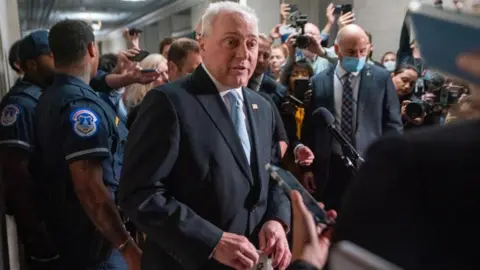US House in turmoil as Scalise scrambles for votes
Confusion reigned on Capitol Hill on Thursday as Speaker of the House nominee Steve Scalise struggled to win enough votes to secure an overall majority in the chamber.
He defeated hardliner Jim Jordan in a private vote on Wednesday.
Mr Scalise, 58, must now work to unite the divided Republicans and secure their backing in a full House vote.
Republicans hold a slim majority, meaning he can only afford to lose the support of five party members.
With no elected Speaker in place, the House finds itself leaderless at a critical time.
It is unable to pass any bills or approve White House requests for emergency aid, such as for Israel following the weekend attacks by Hamas, and it must also pass a spending bill in the coming weeks to avoid a government shutdown.
House Republicans gathered behind closed-doors on Thursday as Mr Scalise and his supporters feverishly sought to sway the people that remained in opposition.
But the meeting ended without a plan for a House vote.
"We're continuing to work to narrow the gap," Mr Scalise told reporters after the meeting. "And we're going to continue to go through this process as we grow our support."
A simple majority, 217, is required for Mr Scalise to win the job. Whether he can accomplish that, however, remains unclear.
Several Republicans have insisted they will not vote for Mr Scalise, including New York's George Santos, South Carolina's Nancy Mace, Colorado's Lauren Boebert, Georgia's Marjorie Taylor Greene and Florida's Anna Paulina Luna.
He can only afford to lose five votes.
Speaking to reporters as he entered the Capitol on Thursday, ousted Speaker Kevin McCarthy said that while "it's possible" that Mr Scalise can gather the necessary votes, it remains "a big hill".
 Press Eye
Press EyeSteve Womack of Arkansas said it remains unclear when a vote will take place and whether Mr Scalise will win.
Any suggestion otherwise, he added, remains "conjecture" partly driven by Representatives "saying one thing and then Tweeting something else".
If Mr Scalise were to successfully win a floor vote, he would become Speaker and end days of paralysis in the lower chamber of Congress, which began when Kevin McCarthy was ousted by hardliners in his own Republican Party.
The slim margin of Mr Scalise's victory in the closed-door meeting on Wednesday - 113 votes to 99 - highlights the deep divisions within the party, and some lawmakers have expressed scepticism that, even now, he has the votes necessary to secure the position.
Among those still opposing him is Texas Congressman Chip Roy - a member of the far-right Freedom Caucus - who told reporters on Wednesday evening that "there are a number of votes that are very much in question for Steve," he said.
"I don't think it's a good idea for us to be barrelling towards the floor," he added.
Mr Scalise is the more traditional candidate in this race. He worked his way up through the party's leadership, built a reputation as a formidable fundraiser and tried to build connections to the party's full range of interest groups and constituencies.
The Democrats will nominate Hakeem Jeffries but as they are the minority party in the House, he has zero chance of getting the job.
